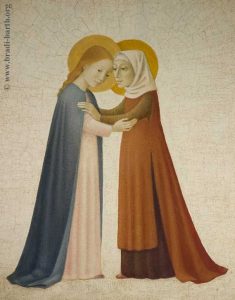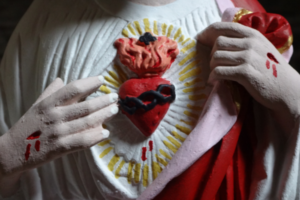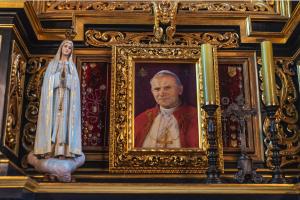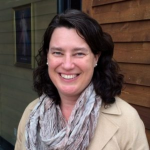
Roe Reversal Amends Law; Time to Amend Hearts
July 14, 2022
A Timely Visitation
Considering that the journey from Nazareth to the village of Ain Karim would have taken around nine to ten days, and that Mary went there after the Angel Gabriel appeared to her, how much time would you suppose passed before Mary had the opportunity to greet her cousin Elizabeth? We know she would not have travelled alone, and so would have needed to wait for a caravan, but the Gospel words telling us she “went with haste” suggest that she succeeded in arriving to Elizabeth rather quickly.

What if the Mother of God arrived there within two weeks of St. Gabriel’s appearance to her? If she did, then when the Mother of God greeted St. Elizabeth we’re speaking of an extraordinary communication between the two smallest human beings ever: the six month-old St. John the Baptist leaps for joy in his mother’s womb at the presence of the Word Incarnate, whose body might have only been 1/100 of an inch long.
At this point, Jesus would indeed be very tiny and Mary would not even be considered pregnant legally according to current federal policy that specifies 14 days after conception, when the embryo has fully implanted in the uterine wall. (This legal definition of pregnancy permits hormonal birth control pills to evade the title of abortifacients even though they may cause the death of the embryo by inducing a thinning of the uterine wall and thus keeping the new life from nesting in the womb).
A Timely Change of Law

Fast-forward to June 24, 2022: the day the Supreme Court overturned the unjust federal law that promulgated from the Roe v. Wade decision back in 1973. June 24th is typically designated the Feast Day of the Nativity of St. John the Baptist. He is the only person whose birthday the Church celebrates in addition to that of Jesus and the Immaculate Virgin Mary precisely because he was cleansed of original sin within the womb by his contact with the Son of God. This year the Holy See moved the celebration of St. John’s birthday to the day before (June 23rd) because in 2022 his birthday feast happened to coincide with the unstationary Solemnity of the Sacred Heart of Jesus’ Feast Day. But naturally, in future years, the celebration of the reversal of the Roe v. Wade decision will coincide with the fruit of St. John the Baptist’s encounter with the very tiny Incarnate God: a holy birth.
The law has a pedagogical effect. People often believe: “If the law permits it, then it can’t be that bad” even in reference to societal scourges such as segregation and abortion. Evidence of how the law of the land affects peoples’ moral views is demonstrated by the 12% increase of support for the Supreme Court’s overturning of Roe v. Wade as seen through two recent polls: one taken not too long before and the other just after last month’s ruling1.

Understanding this pedagogical effect of the law with the recent Supreme Court decision, it’s important for us to be particularly sensitive to people who may have their consciences awakened about the reality of the abortions they may have had or helped in some way someone else to have. When we have done something wrong, a well-formed conscience testifies to our own selves so that we will be moved with remorse and have a conversion of heart. The conscience does its job by “pricking us”, which many of us can verify is not a pleasant experience. Some people react to the discomfort by ignoring or trying to silence their conscience.
A Time for Mercy
I’m reminded of a story of St. Padre Pio who was renowned as a confessor for knowing the sins of the people who came to him before they even spoke them. Sometimes, when people didn’t remember all of their past grave sins, he sent them away with the order to reflect more. This happened with a young woman who returned to the confessional without being able to recall that she had had an abortion long ago and had never confessed it. When she came back to the confessional after he had already sent her away a few times to reflect, St. Padre Pio prodded her memory by pointing out: “He [the aborted baby] could have been a priest or a bishop”. Then her tears flowed.

Given that there have been over 65 million abortions since Roe v. Wade in the United States we are talking about a great multitude of men and women whose consciences might be awakening to what they have been a participant in. This is where the Sacred Heart of Jesus comes in: I mentioned above that it was the moveable Solemnity of the Sacred Heart of Jesus that bumped St. John the Baptist’s birthday celebration. We can hear St. John the Baptist repeating now in heaven the reply he gave when someone observed to him that his followers were becoming disciples of Jesus instead: “He must increase; I must decrease” (Jn 3:30).
The Sacred Heart of Jesus overflows with mercy. What must be the pain and sorrow of men or women who come to recognize their responsibility for the death of their own child? Self-loathing, depression and despair threaten their peace. That is not what Our Lord desires for them. His tender heart longs to embrace each one of us, no matter what we have done. He wishes for us to experience his mercy and forgiveness. He yearns for us to be freed from the chains that come from the misuse of our freedom and instead enjoy: “the glorious freedom of the children of God” (Rm 8:21). Let’s make a special effort right now to be messengers of God’s infinite mercy! Let’s be like St. Thérèse of Lisieux, who compared the worst sins to a small drop of water that sizzles up when brought in contact with the fiery furnace of God’s love.
A Time for TOB

God had promised in the Old Testament that he would write a new law on the fleshy tablet of the heart (Cf. Jer. 31:3). Right now, the stone tablets of abortion laws are being readjusted throughout the 50 states, but what matters above all are human hearts. How worthy is the endeavor of imbuing a culture of life in the broken hearts of the afflicted and the tender hearts of our youth! Pope St. John Paul II’s Theology of the Body teachings contribute greatly to a vision of the human person that involves an authentic love and inherent dignity of life from conception to natural death. JP II’s scriptural reflections include reverence for God and others who are made in God’s image as male or female, gratitude for the gift of creation, especially the gift of life, and an appreciation for marriage and family. Now, more than ever, is a poignant time for learning and spreading this critical Christian worldview. A culture of life hinges on reaching all human hearts with the truth, beauty and goodness that is Theology of the Body. It is about time.
_____________________________________________________________________________________________________
[1] “A May Marist poll found that 64% of Americans opposed overturning Roe, while only 33% supported” it while a June Harvard/Harris poll showed “nearly half (45%) of Americans support the Supreme Court’s ruling that overturned Roe vs. Wade, while 55% oppose” (downloaded July 7, 2022).

Written by,
Dr. Joan Kingsland*,
Theological Consultant for Ruah Woods Institute
*Joan Kingsland SThD, has been a member of the Society of Apostolic Life, the Consecrated Women of Regnum Christi since 1993. She earned licentiate and doctoral degrees in moral theology at the John Paul II Institute for Marriage and the Family in Rome, as well as a Bachelor of Arts degree from Thomas Aquinas College, and a Master of Arts degree from the Pontifical Institute of Medieval Studies at the University of Toronto. She taught moral theology and Catechetics at Mount St. Mary’s Seminary in Cincinnati from 2016-2018, moral theology at Mater Ecclesiae College in Rhode Island from 2006-2015, and Catholic Faith Formation, grades 5-10 at the Highlands School in Dallas, Texas from 2002-2006. During the academic year she resides in Rome and teaches the Social Doctrine of the Catholic Church at Regina Apostolorum Seminary, and in the summer returns to Cincinnati to work in person at Ruah Woods Institute to help in developing training and formation for educators K-12 to become witnesses and passionately understand and teach Theology of the Body to their students.
Share